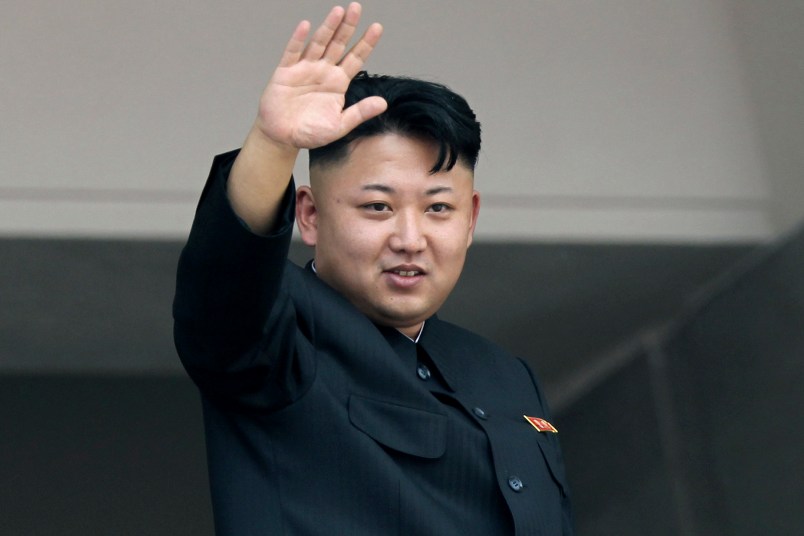Sony’s bromance The Interview freaked out North Korean leadership. While various experts have disputed the White House’s claim that North Korea was responsible for the Sony hack, we can be certain about the Kim Jong Un regime’s outraged response to the film overall—a response that culminated in North Korean representatives arguing their case before the United Nations. (How many films get trashed at the UN?)
But while this outrage reveals how little a totalitarian dictatorship can tolerate criticism of its leader, we Americans ought to take note: When it comes to tolerating criticism of our own government, it doesn’t take much for own outrage industry to burst into high gear. While the hack (whoever did it) was an act of cyberterrorism, the rest of North Korea’s protesting talk sounds frighteningly American.
Really. Remember March 2003? That’s when Natalie Maines, lead singer of the popular country music group The Dixie Chicks, told a British audience, “We don’t want this war, this violence, and we’re ashamed that the President of the United States is from Texas.” Compared to The Interview’s extended, ribald parody of North Korea’s leader, one that culminates in a slow-motion shot of his exploding head, Maines’ critique of America’s president was brief and mild. Moreover, Maines hails from a nation that prides itself on nothing more than its freedoms, and indeed consistently deploys those freedoms to contrast itself with dictatorial or repressive nations around the world. It was Bush himself who argued that “they hate us for our freedoms,” an argument that has been rehashed in response to The Interview controversy.
Yet the response to Maines’s comments from millions of her fellow Americans was as outraged, as extreme and as violent as anything out of North Korea. North Korea may indeed have been responsible for what amounted to a boycott of Sony’s film, although the decision to pull the film was the company’s own. On the other hand, numerous country music radio stations and millions of country listeners boycotted The Dixie Chicks themselves, refusing to play their music, destroying piles of their albums, labeling them “Saddam’s Angels,” the “Dixie Sluts,” and so on.
Similarly, North Korean hackers may well have made vague threats of violence against movie theaters that chose to show The Interview. But Maines and the Dixie Chicks received much more overt and widespread death threats, to the point where the singer and group were forced to withdraw from the public eye for some time out of fear for their own safety and that of their families. Such attacks were egged on, if not orchestrated, by the nation’s most prominent conservative voices, as exemplified by Rush Limbaugh’s multi-day tirade against the group. And they were undoubtedly tied to rhetoric emanating from the highest levels of American government, such as Bush’s “Either you are with us, or you are with the terrorists” remark.
Remembering the response to Maines in this moment would serve as a glass houses moment for Americans, and would make clear that any critique we make of North Korea’s inability to bear criticism of its beloved leader will be necessarily hypocritical. Yet engaging with this recent American history would serve other and more important purposes as well. It would force us to confront our own idolizing impulses, a desire to venerate heroic images of our leaders that has its origins in the Founding Fathers narrative and has made its way down to the modern worship of Bush, Ronald Reagan, and John F. Kennedy among others.
Moreover, the Maines response illustrates how quickly we can abandon our ideals of freedom if they contrast with such passionately held perspectives. Bush’s public statement on the attacks on and threats against Maines and the Dixie Chicks was that “Consequences are the price we all have to pay for our freedoms.” Yet it’d be more accurate to say that Maines’ millions of critics were happy to see her freedoms abridged when they conflicted with their beliefs about their leader and nation. In such moments, the gap between America and North Korea seems all too slight.
Ben Railton is an Associate Professor of English Studies and Coordinator of American Studies at Fitchburg State University and a member of the Scholars Strategy Network.







BUt MAINEs cOMMEnts Were CLEARLY antI-AmericaN, Libtard!11!1!one!!1!!!
Anti-Texan… Nothing wrong with that!
That’s funny. I clicked om TPM, but an article from Salon appeared.
As stupid as the outrage expressed towards the Dixie Chicks was there is a big difference between boycotts and outrage from ones fellow citizens and acts of reprisal from the government. As for the comparison between the responses to Dixie Chick’s statement and The Interview, a less apples to oranges comparison might be to ask how the government of North Korea would have responded to a group of North Koreans making similar statements about their leadership to how the US government responded to the Dixie Chicks.
If you can’t tell the difference between a totalitarian government’s overreaction to criticism of a leader and the overreaction to criticism of a leader of one ideological slice of the population of a democracy, you might be an associate English professor at a regional state university.
The smacking sound you hear is coming from the faculty of the Fitchberg political science and history departments smacking their heads.